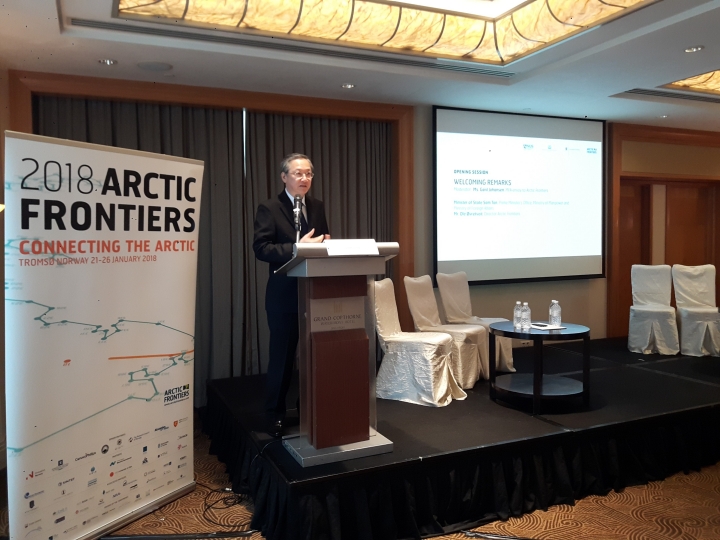
Minister of State in the Prime Minister’s Office, Ministry of Foreign Affairs and Ministry of Manpower Sam Tan, delivered opening remarks at the Arctic Frontiers Abroad Forum “The Future of the Arctic: Geopolitical, Environmental and Business Perspectives” held in Singapore on 29 September 2017.
Launched in 2007, the Arctic Frontiers Conference is held annually in Tromsø, Norway. It brings together policy makers and scientists to discuss Arctic issues and opportunities. MOS Tan has participated in the Arctic Frontiers Conferences since 2015. The Singapore edition is the first Arctic Frontiers Abroad Forum held in Asia, and is supported by the Royal Norwegian Embassy in Singapore, the Singapore Ministry of Foreign Affairs and the National University of Singapore. Other Arctic Frontiers Abroad Forums have been held in Denmark, Canada and Germany among others.
MOS Tan’s opening remarks is appended.
MINISTRY OF FOREIGN AFFAIRS
SINGAPORE
29 SEPTEMBER 2017
===================
REMARKS BY MINISTER OF STATE IN THE PRIME MINISTER’S OFFICE, MINISTRY OF FOREIGN AFFAIRS AND MINISTRY OF MANPOWER SAM TAN CHIN SIONG AT THE ARCTIC FRONTIERS ABROAD “THE FUTURE OF THE ARCTIC: GEOPOLITICAL, ENVIRONMENTAL AND ECONOMIC PERSPECTIVES”, FRIDAY, 29 SEPTEMBER 2017 AT 9.30AM, GRAND CORPTHORNE WATERFRONT HOTEL
Ambassador and Senior Arctic Official, Her Excellency Anniken Krutnes,
Ambassador-designate to the Republic of Singapore, Her Excellency Anita Nergaard,
Director of Arctic Frontiers, Mr Ole Ovretviet
Distinguished speakers,
Ladies and Gentlemen,
A very good morning to all of you. It seems only yesterday that I was in Tromsø in Norway to attend the 11th Arctic Frontiers Conference, which I have been doing so for the past 3 years. So it is indeed a pleasure to attend yet another Arctic Frontiers Forum, but this time in sunny Singapore.
2 The Arctic is changing. Arctic ice is melting twice as fast and at an alarming rate since 2010. In August, Russian LNG tanker, Christophe de Margerie, made the journey along the Northern Sea Route from Norway to South Korea in just 19 days, 30 percent faster than the traditional route through the Suez Canal. These developments indicate the significant changes that the Arctic is undergoing. We need to have more exchanges and dialogue to understand the situation and prepare for such changes that are coming our way. I am happy to join you today to discuss the Future of the Arctic from the Geopolitical, Environmental, and Business perspectives.
3 As an Arctic Council observer, Singapore has played its part to contribute to the sustainable development of the Arctic. We participate actively in the Emergency Prevention Preparedness and Response (EPPR) and Conservation of Arctic Flora and Fauna (CAFF) Working Groups where we share Singapore’s best practices and knowledge in preventing oil spill and conserving biodiversity. Earlier this year, I had the privilege of opening the Arctic Migratory Bird Initiative (AMBI) Workshop at Sungei Buloh Wetland Reserve. I understand some of you made a visit there yesterday. Sungei Buloh Wetland Reserve is indeed part of our efforts to conserve Mother Nature. It is important to have these forums where stakeholders and experts can exchange information and forge a common vision for the future of the Arctic. We hope to organise similar forums in future to continue the conversation on the Arctic in Singapore, as well as raise awareness of the changes in the Arctic in our region.
4 The future of the Arctic’s environmental wellbeing is also critical for Singapore and Southeast Asia. We are concerned about rising sea levels. Singapore is a low-lying island with almost 30 percent of the land less than 5m above the mean sea level. In fact, our National Climate Change Secretariat, which develops and implements Singapore’s domestic and international policies to tackle climate change, has predicted that sea levels will rise between 0.25-0.76m towards the end of the century due to climate change and global warming. The Arctic is a globally significant barometer of the impending changes in our world. In my travels to countries such as Canada and Norway, it is often said that whatever happens in the Arctic does not stay in the Arctic. Vice versa however, whatever happens outside the Arctic does not stay outside the Arctic as well.
5 The changes also bring other opportunities and challenges. In particular, the opening of new Arctic water channels, such as the Northern Sea Route, could significantly reduce shipping travel time between Asia and Europe. This could give a boost to the maritime industry although the full cost of commercial transportation in the new shipping lanes is still not fully known. A new shipping route could also complement Singapore, which has one of the world’s busiest ports, receiving about 120,000 vessels each year. This translates to 300 ships every day and 12 ships every hour. As a seafaring nation, our marine industry has developed decades of experience and strong credentials in shipbuilding and repair, offshore engineering, port operation and marine support services. Singapore can further contribute to the development of maritime infrastructure to help facilitate safe shipping in the Arctic region. In fact, several shipping companies from Singapore such as Keppel Offshore & Marine develop icebreakers and offshore rigs that operate in the Arctic, while ST Marine and SembCorp have the required competency to construct ice-class vessels. Keppel was also the very first Asian shipyard to build icebreakers.
6 In conclusion, Singapore hopes to support and engage in future conversation on the Arctic so as to embark on concrete cooperation. Singapore is grateful for the support and friendship we have received from the Arctic Council Member States and Permanent Participants. We will continue to do more to promote awareness of the Arctic in our region and to contribute to its sustainable growth and the empowerment of its peoples who live in the Arctic. On that note, I wish you a fruitful forum ahead. Thank you.
. . . . .